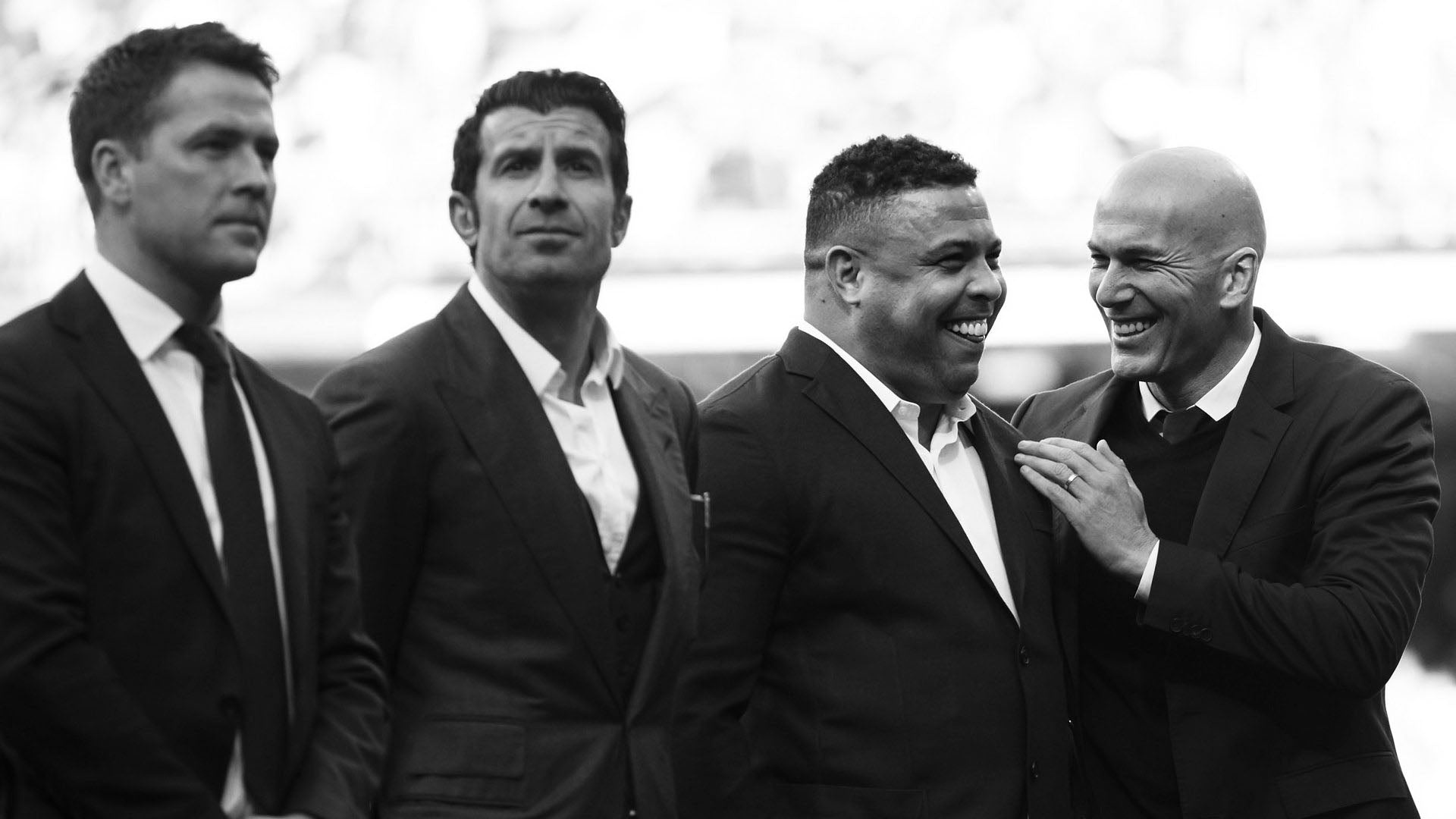
The Galacticos
THE GALACTICOS
In 2000, Real Madrid’s Florentino Perez started the Galacticos era when he created a new policy under which Real Madrid would buy a super player (which meant the best player in the world) at the end of every season.

Prior to Perez’s arrival, Los Blancos were coming off a disappointing season, finishing runner up to Barcelona in La Liga and failing to retain their Champions League title in 1999.
Real Madrid's experienced core, including the likes of Fernando Hierro, Fernando Redondo, and Roberto Carlos, struggled with this new strategy. Originally, Florentino Perez’s project was known as “Zidanes y Pavónes.”
The strategy was to mix superstar signings, such as Zinedine Zidane, with graduates of the club’s youth academy, such as Francisco Pavón. Very quickly it seemed as if the “Pavónes” were forgotten.

Perez would soon make a habit of bringing in one huge name each summer. One of his campaign promises was that, were he to be elected, he would sign Luís Figo from fierce rivals, Barcelona. He made good on his promise and followed up the move with the signings of Ronaldo and David Beckham in the years that followed, and spending $66 million on Juventus star Zinedine Zidane.
ZINEDINE ZIDANE
The French maestro adapted wonderfully to Del Bosque’s diamond setup, orchestrating play behind Raul and Morientes. His compatriot, Makélélé, was brought in to do the “dirty work” and quickly emerged as one of football’s elite midfield destroyers. Figo and Santiago Solari ran rampant on the wings with the Frenchmen dominating the proceedings in the middle of the park, forming a creative and versatile midfield unit.
For a brief period each year, the footballing world would turn its attention to Real Madrid. It became much more than routine signings, however. They were events! The players were expensive, but the fans went wild. Merchandise and shirt sales went through the roof. Soon, however, ‘Zidanes y Pavónes’ made way for another neologism: ‘Galacticos’.
Perez’s first presidency would last until 2007 and in that time a number of players arrived at the Santiago Bernabeu to great fanfare. Some went on to become legends, the very definition of Galacticos. Others faded quickly into the background of the club’s history.
The results.
Initially, the policy paid off with 2 league titles and 1 Champions League title (Zidane and Figo were on that squad). Zidane was unleashing his talent on the football world, scoring impossible goals. Ronaldo won the player-of-the-year award.

Vicente Del Bosque
(coach of Real Madrid at that time) was able to control egos in the locker room... for a period of time. They needed to develop the insulation of tactical play as well, and ultimately he had to drop some of the big name players.
One very pivotal point was the arrival of Beckham and departure of Makélélé to Chelsea. Real added another super star but soon began a series of years minus trophies for Real Madrid and title-filled years for Chelsea. Real Madrid sold the world’s best defensive player just because he wanted an improved contract.
Zidane said afterward that “...Beckham is the gold plating on a car, but what good a car is if it’s engine is sold;” referring to Makélélé departure. Makélélé once said that “When we did not know what to do with the ball, we just gave it to Zidane, he would always work something out.” They were stronger together.

In 2004, Real signed the "Wonder boy" Michael Owen, exceptional player, who finished four goals above club legend Raul, and also scoring in a 4-2 El Clasico win over Barcelona.
REAL MADRID
In an interview with ESPN, Raúl González recalled that the Real Madrid dubbed “los Galacticos” following the arrivals of Ronaldo Nazario and David Beckham, failed to win a single European Cup. "I can't remember exactly when people started calling us 'Galacticos,' but I think it was after we signed Ronaldo and Beckham, or at some point between their arrivals... We didn't win a single Champions League title. People remember that era because Florentino Pérez put a lot of hard work into raising the club's international profile," said Raúl.
"What I mean to say is that yes, it was a great time to be at the club. Professionally it was amazing to play alongside such great players, but the truth of the matter is that we didn't win as much as people think. David Beckham only won the league once, and that was after Fabio Capello told him he would never play again. He did though, and we went on to win the league title quite heroically. However, that was back in 2007.”
The Galactico Policy put the club in a stable position, and although Barcelona dominated the football scene for the next few or more years, it wasn't because of Madrid's inability. It was due to Barcelona's own brilliance and home-grown players. Florentino Perez learned from his mistakes and from our rivals' strengths. During his second tenure, he made certain Real Madrid became one of the most successful clubs financially, and as a team. Madrid is no longer just marketable, but strong in a sporting sense as well.

Bottomline is, the first Galactico era, although widely regarded as a failure, was not a failure. It made lovers of the beautiful game all around the world. The club gained financially and became stable, while Flo Perez learned some valuable lessons. This paved the way to future financial and sporting successes for the club, and in also once again making Real Madrid the best club in the world.
Be a TENLEGEND™.
